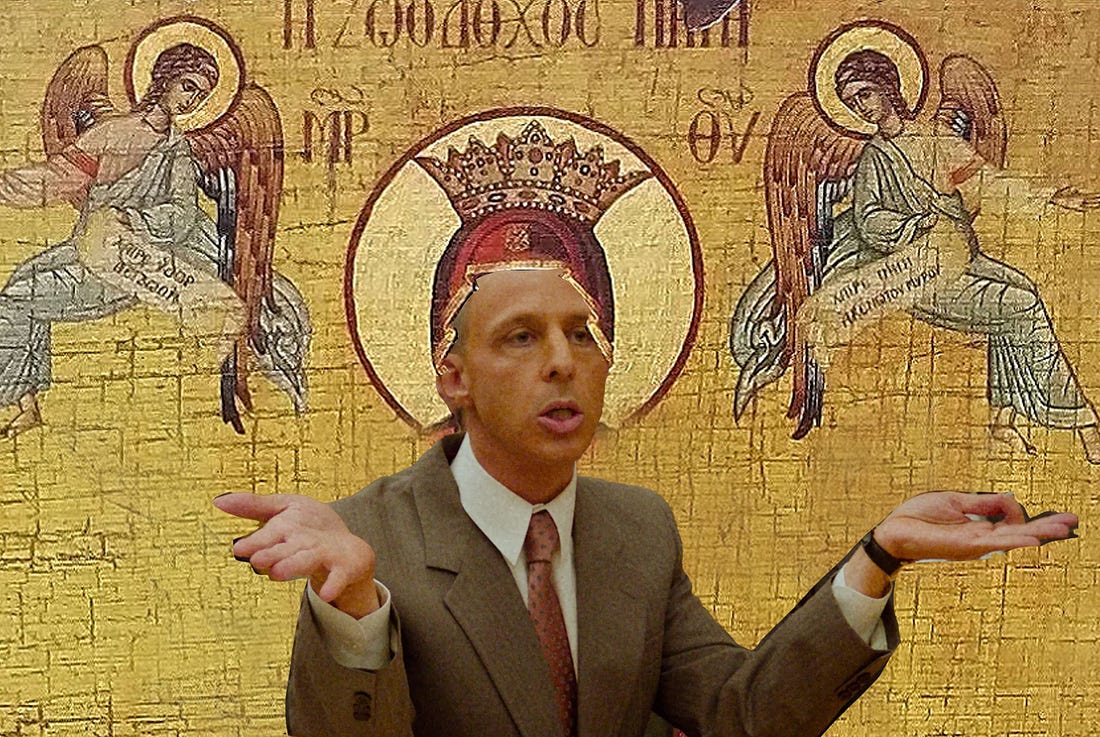“No verbal tic better represents the way the internet has completely melted down and re-molded our brains in its image.”I hate it when you say, “This isn’t a hot take, but …”✨ Hate Read Season 2 is brought to you by the legendary champion of indie media herself, Ruth Ann Harnisch, of the Harnisch Foundation. ✨It’s a phrase I hear my friends, my colleagues, and even my mother say again and again: “This isn’t a hot take, but…” (Or its closely related variants: “Now, this isn’t exactly a new take…” “I’m not the first to say this…”) They then proceed to say something generally unobjectionable, if not completely uninventive and unoriginal. (“…The Sopranos was the blueprint for a generation of TV,” for example, or “…Trump is trampling over the Constitution.”) The earth remains unshattered by these revelations, and I end up questioning why those qualifiers were necessary at all. We’re chatting, not taking out patents. I’m happy to nod at your take, “yes-and” you, or offer up some most-likely milquetoast rejoinder of my own. In other words, have a conversation. So why all the throat-clearing? Couching your opinion as “not a hot take” distances us from what we’re saying and credits it to an amorphous someone else. We deploy the phrase like it’s a floating trademark sign, like we’re terrified of being sued by the originator of said take and can avoid that outcome with the right combination of words spoken in defensive deference. In this manner it seems perfectly suited for our hyper-litigious age — also an age, I might add, in which entertainment conglomerates jump to greenlight recycled intellectual properties they deem as risk-free investments. We seem to have internalized the lesson that, even in conversation, it’s less risky to advance an idea as a watered-down sequel than to proffer something new. (“Other people have thought this,” we seem to take comfort in implying. “If you don’t agree, it’s not my fault. The problem is with the source material.”) But why do we see conversations as riddled with so much risk? The main fear expressed by “not a hot take, but”-ism is that of being called out. Indeed, no verbal tic better represents the way the internet has completely melted down and re-molded our brains in its image. “Not a hot take, but” is language born of quote-tweeting, of ratioing, of the looming feeling that at any moment we can be singled out for not knowing enough, for copying someone else, for, well, anything. “Not a hot take, but” is language born of the goosebumpy suspicion that someone is always watching over your shoulder. It’s the language of “historian here” information dumps. (You thought you had something interesting to say about New York’s bridges? Someone is about to use your tweet as a launchpad for their own spiel about Robert Moses.) Still, even though it’s of the internet, the “not a hot take” phenomenon is much more common offline, where you’re theoretically much less likely to get swarmed by trolls. Maybe that’s because having the thought that what you’re saying isn’t new might stop you from posting (though a search of “not a hot take” on X/Twitter reveals no shortage of its use, especially by fans debating which wrestler is the best or which anime ship is the most problematic,) but it’s not enough to stop you from talking. Or maybe that’s because it also serves to signal that you’ve done the reading (in an appealingly nonspecific way, just in case you haven’t actually done it). In that context, the phrase seems like nothing more than a crutch for transitioning from the feed to the dinner table. (“There’s conversation happening out there,” it says, “and, try as I might, I can’t ignore its presence while we talk in here. But look how normal I am being about it!”) There’s something fundamentally superstitious about “not a hot take, but,” as if its utterance at once conjures up the discourse and holds it at bay. I’m not saying that we should ignore online life when we’re offline. And I don’t mean to deny that sometimes there are fragments of ideas floating around my brain that feel external to me, yet impossible to source. But that, I contend, is the human condition. Nothing, especially not an opinion, is truly our own: we’re all amalgamations of ideas, language, and instincts — inherited and absorbed. But that shouldn’t stop us from experimenting in in-person conversations, from trying out a take and not worrying that someone is about to say someone has said that before. Me? I do what those holding court at dinner parties have done for generations: puff out my chest and advance a take as my own, then fiercely defend it, even — or especially — if I don’t mean it. —The One Person on the Internet With Perfect TakesYou are reading a pseudonymous post from a friendly neighborhood writer as part of Season 2 of our limited-run Hate Read pop-up newsletter. Make sure you’re subscribed to Deez Links to get ‘em all safely in your inbox, the better to hate-forward.You’re currently a free subscriber to Deez Links. For the full Deez, upgrade your subscription. |

